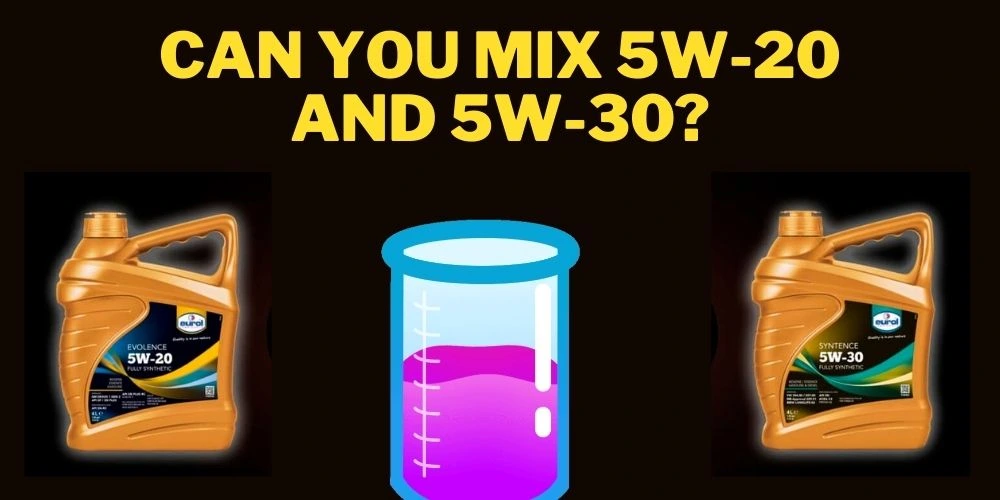Coolant is one of the most important components of your car, and you need to keep a special eye on it. You need to check it from time to time, or else your car’s air condition can be affected. But how?
Does coolant affect AC in a car all the time?
Coolant is a heat transfer fluid and an integral component of your car’s AC. This cooling component is spread throughout your vehicle’s engine section. It helps in keeping the cylinders in a cool state and resist them from being overheated. In other ways, we can say that the coolant takes the heat from the interior sections of your car and spreads it elsewhere.
By doing so, the interiors of your car stay cool. Coolant’s working principle depends on how the air conditioner works. So, the AC of the vehicle and the coolant are connected. When the car’s interior is too heated, the coolant works more, and at the same time, you can see differences in the air conditioner’s performance.
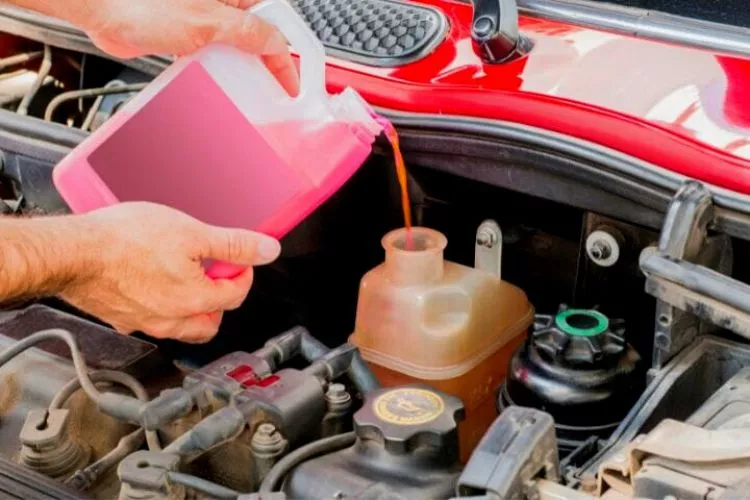
Contents
Does coolant affect ac in a car?
In short, we can say that the coolant can affect your car’s air conditioning. We have already said that a car’s coolant and AC are internally connected, and their performance is dependent on each other. Coolant directly affects the car’s interior section’s temperature, airflow, and humidity.
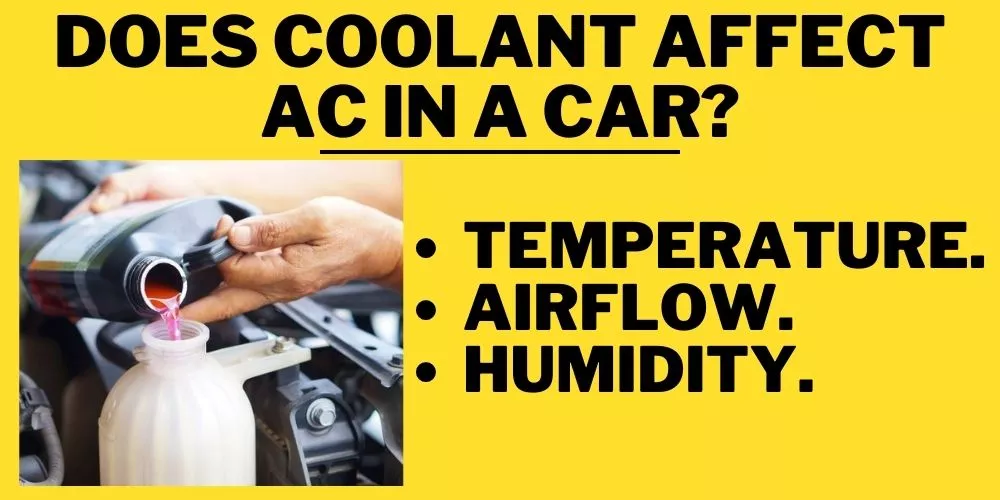
Temperature
The interior of a car is one of the closest components to its engine section. The interior section of a vehicle can easily become heated for the coolant. The coolant is present all around the engine of the car. When the engine becomes heated, then this coolant starts to work. It absorbs the excess heat and starts to expel hot air.
Airflow
The amount of cool air entering a car’s air conditioner depends upon the car’s coolant. So, coolant directly affects the AC’s performance. If your car doesn’t have sufficient coolant, then the hot air flow will directly increase, raising the temperature and humidity of the interior sections.
Humidity
Home ACs help maintain the moisture level of the air. In the same way, car ACs help control the humidity level of the car’s interiors. If the humidity level is reduced too much, then the car’s passengers’ and the driver’s skin and mouth can feel dry. If the car’s engine section has enough moisture, the coolant can release humidity.
But it doesn’t mean whenever there is any issue in the car’s AC, then the level of coolant is the only reason. There are also other reasons the AC can’t give its best. The other two most common reasons are the issue in the thermostat, leaks, or incorrect fitting of the radiator.
Can low coolant affect air conditioning?
Your car’s AC performance can get affected by low coolant. Coolant helps the radiator and the other internal components of your vehicle’s air conditioner work properly. If sufficient coolant is not present in the car, then the engine section of the car will be easily overheated, affecting the AC and the car’s performance.
So you need to always check and track the coolant’s level. Even the car’s radiator can burn up if you drive the car for a long time with low coolant.
On the other hand, some people add extra coolant when the chamber is filled up. This is also very harmful; in this condition, the cooling fans of the engine won’t work properly, so the car’s engine quickly gets overheated.
A faulty coolant level sensor can also be a reason for a problematic air conditioner. So, you need to check the reservoir manually, time-to-time.
Is refrigerant and coolant the same thing?
Many people think that refrigerant and coolant are the same liquid with two separate names. This is not true; even if you replace one with the other, then the AC of the car will be very badly damaged, and the car’s performance will also be affected.
Now, let’s discuss these two elements; separately. It will help you in building a better understanding.
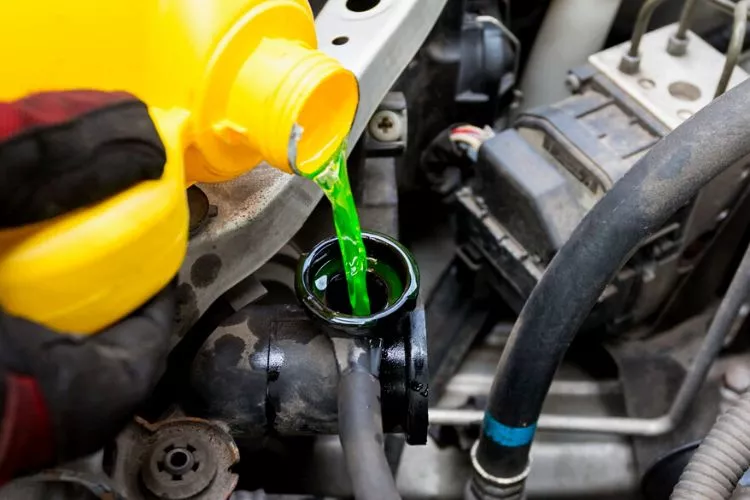
Coolant
The main objective of coolant is to keep the car’s engine cool and resist it from getting overheated. It also helps in maintaining the under-hood temperature. To keep the internal temperature level, the coolant continuously circulates between the car’s radiator and engine.
For the antifreeze elements, coolants also protect the car’s engine from freezing. To some extent, this also resists rusting. You must check the coolant level from time to time, and if required, you must change it.
Refrigerant
Coolant controls the under-hood temperature. And refrigerant controls the temperature of the internal section; it ensures that the passengers don’t sweat inside the car. In a vehicle’s air conditioning system, refrigerant plays an important role. The R-1234yf is the most effective and eco-friendly refrigerant of this time, and it is used in most cars.
To keep the interior of a car as cool as possible, refrigerant works in a cycle. It transforms itself from liquid to gas and vice-versa, simultaneously, through a very fast process. Refrigerants don’t need to change from time to time; unless the car’s AC gets damaged or the car has faced a fatal accident.
Does coolant affect heat in cars?
Coolant is one of the heat transfer mediums of a car. The heater will not blow hot air if your can has insufficient coolant. The heat that the coolant absorbs from the engine passes to the radiator. In summer, it also disperses heat from the air; in winter, this heat can be used to spread heat throughout the cabinet.
Signs of low coolant in car AC
Besides checking the radiator reservoir, manually, some other indirect signs indicate your car has inadequate coolant.
- Heat: If your can is getting heated faster than regular, you should check the coolant level once.
- Inefficient AC: If you feel that the car’s AC is not giving its best, please check the coolant’s level.
- AC stops irregularly: Coolant is the main component that measures temperature. Insufficient coolant in a car can damage the temperature sensor, and it will pass a message to the AC to stop.
How do I know if my AC needs to be recharged?
Car ACs need sufficient refrigerants to perform their jobs seamlessly. Some signs directly indicate that the AC needs to be recharged. If the car’s AC starts to blow normal room temperature air, then you must recharge the AC.
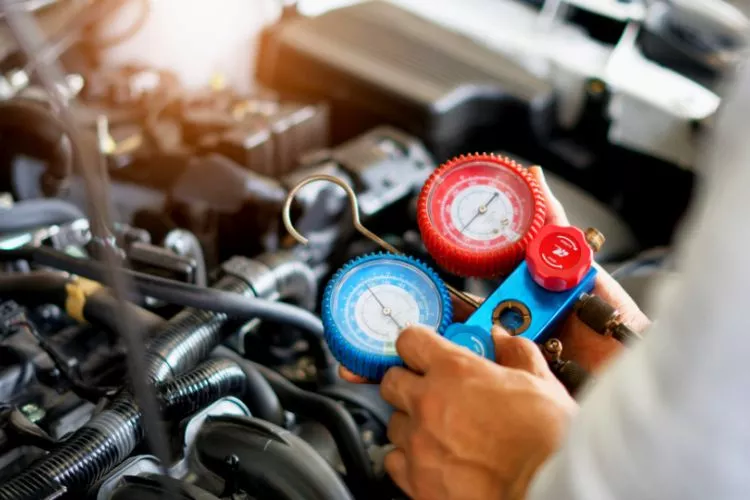
Another very effective sign is the clicky sound of the clutch. If you don’t get it, then the AC needs more Refrigerant. These two are the most effective signs of such a condition when your car’s AC needs to be recharged.
How long does it take for car AC to get cold after recharge?
After recharging, your car’s AC can get cold within 15 to 20 minutes. If your car has additional heat-absorbing material, it will take more time.
Conclusion
Coolant plays a very important role in a car’s AC mechanism. It keeps the heat within a limit and resists the car’s engine from overheating. The AC’s performance is more or less dependent upon the coolant.

